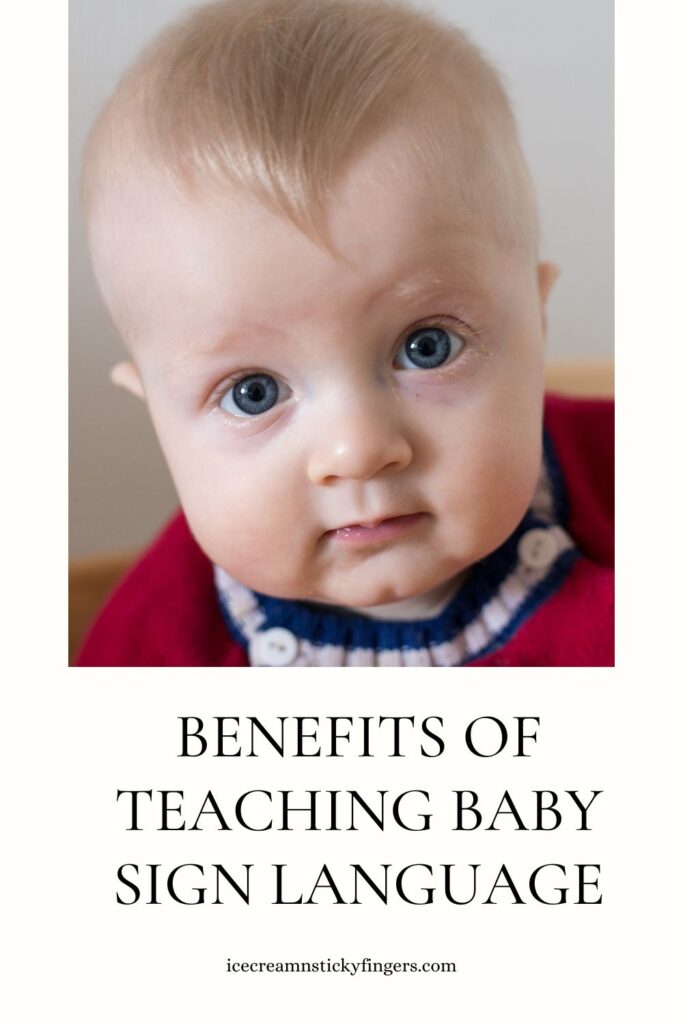What are the benefits of teaching baby sign language? Teaching baby sign language can have numerous benefits for both the baby and the caregivers. Here are some of the key advantages:

Early Communication
Babies often develop the physical ability to gesture before they can speak, which means they can express their needs and wants earlier using signs. This can reduce frustration and improve communication between babies and their caregivers.
Reduces Tantrums
By enabling babies to express themselves through sign language, they are less likely to get frustrated or throw tantrums when they cannot convey their needs effectively.
Early Insights into Child’s Needs
Since babies can communicate earlier through signs, parents can gain valuable insights into their child’s thoughts, preferences, and interests at an early stage, which can facilitate responsive caregiving.
Accelerated Language Development
Some studies suggest that teaching sign language to babies can enhance their overall language development. As babies observe and imitate signs, they may develop better language skills, including improved vocabulary, sentence structure, and grammar.
Increased IQ and Cognitive Benefits
Research has indicated that babies exposed to sign language may experience cognitive benefits, including potential increases in IQ and overall mental development.
Boost in Motor Skills
When babies learn to use their hands and fingers to make signs, it enhances their fine motor skills, which can be beneficial for various other activities and tasks as they grow.
Strengthening Parent-Baby Bond
Learning and using sign language together can enhance the bond between the baby and caregivers. It encourages more face-to-face interactions and responsiveness, which fosters emotional connections.
Early Exposure to a Second Language
If baby sign language incorporates signs from a different language, it exposes the baby to a second language at an early age, potentially laying the groundwork for future language learning.

Enhanced Language Skills
Babies exposed to sign language from an early age may exhibit better language skills as they grow older. They tend to have larger vocabularies and may develop speech more quickly.
Increased Confidence and Independence
When babies can express their needs independently, they develop a sense of confidence and autonomy, which can lead to a more positive self-image as they grow.
Inclusive Communication
Baby sign language is particularly useful for children with hearing impairments or other communication challenges, allowing them to interact and communicate with their caregivers effectively.
Early Insights into Baby’s Mind
Through sign language, caregivers can gain early insights into their baby’s thoughts and understanding of the world. This can be fascinating and help caregivers respond more effectively to their baby’s interests and preferences.
Improved Parent Observation
Teaching and using baby sign language encourage parents to pay closer attention to their baby’s cues and nonverbal communication, leading to better understanding and responsiveness to their needs.
Fun and Engaging
Learning sign language can be a fun and interactive activity for both the baby and caregivers, making communication a playful experience.
Cultural and Educational Benefits
Introducing sign language early on exposes babies to different cultures and encourages them to be open and accepting of diversity.
It’s important to note that while baby sign language can be beneficial, it’s not a replacement for spoken language. Encouraging spoken language development should also be a part of the communication process. Additionally, consistency and patience are key when teaching baby sign language, as it may take time for babies to grasp and use the signs effectively.








So many benefits. My son had delayed speech so we taught him some signs. He used more a lot!
I think babies learning sign language is great and there are so many great benefits. My sister taught her baby a few signs and it was so adorable.
I wish that I knew baby sign language with my oldest son. He had speech problems and did not talk until 3 years.
As a mom, I appreciate learning about the positive impact it can have on early communication, reducing tantrums, and providing early insights into my baby’s needs.
Thsi is an interesting read and I agree with you that allowing babies to communicate their needs as early as possible can help reduce tantrums. Hope you can share more tips on how to teach babies sign language. I have no idea how to get started.
I think it’s a beautiful thing to be able to give children tools to communicate as early as possible. I love that we’re starting to see that sooner and have incorporated teaching infants sign language!
This became more popular after my kids were little. I always thought it would be neat to be able to teach sign language to babies!
This is an amazing post, I do agree that babies should learn sign language, so that they communicate their need to us. And it is good to have as well. Thanks for sharing this amazing post with us.
The idea of babies learning sign language to communicate their needs to us is an interesting one, I do agree with you. This is a great post and need to share with others.